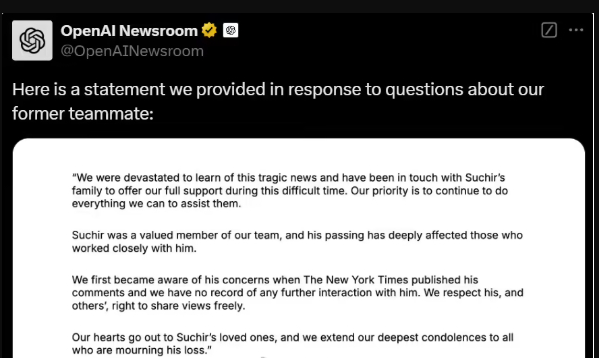OpenAI issued a statement regarding the death of former employee Suchir Balaji, but the timing and content of its response sparked widespread controversy and was accused of being perfunctory and trying to avoid responsibility. In the statement, OpenAI expressed shock and said it had contacted Balaji's family to provide support, but emphasized that they first learned of Balaji's concerns through the New York Times report and have not had any interaction with Balaji since. The statement also mentioned respecting employees' rights to express their opinions.
OpenAI recently issued its first official statement regarding the death of former employee Suchir Balaji. However, the content and timing of its response caused controversy. The public questioned its perfunctory attitude and intention to avoid responsibility.
In a statement, OpenAI said it was deeply shocked by the tragedy and said it had contacted Balaji's family to offer support. The company emphasized that it first learned of Balaji's concerns when the New York Times published his comments and has not had any interaction with him since. The statement also said it respects employees' right to express their views freely.

However, the belated response sparked criticism on social media. The public believes that OpenAI chose to speak out when public opinion faded, a month after Balaji was found dead in his San Francisco apartment on November 26, and the incident was reported in the media and sparked heated discussions, which seemed to be too cautious and indifferent.
Critics pointed out that the statement's emphasis on details such as "first learning of the concerns was through the media" was considered to be an attempt to distance the company from the tragedy, rather than a sincere response to the incident itself.
The controversy has also sparked a broader discussion about how technology companies deal with internal dissent and protect the rights of whistleblowers.
This incident not only raised questions about OpenAI's handling of internal issues, but also once again highlighted the challenges faced by technology companies in employee rights protection and crisis communication, and the need for a more transparent and responsible response mechanism.